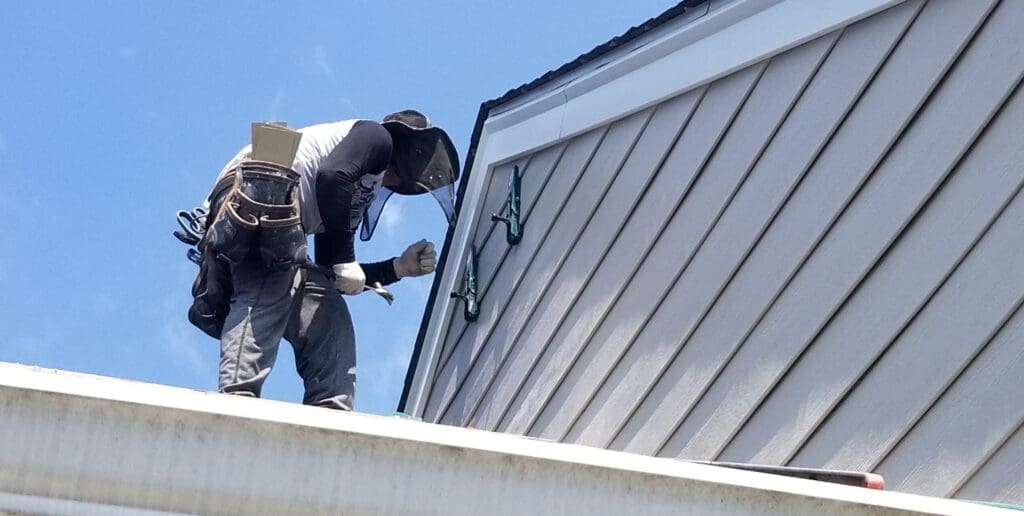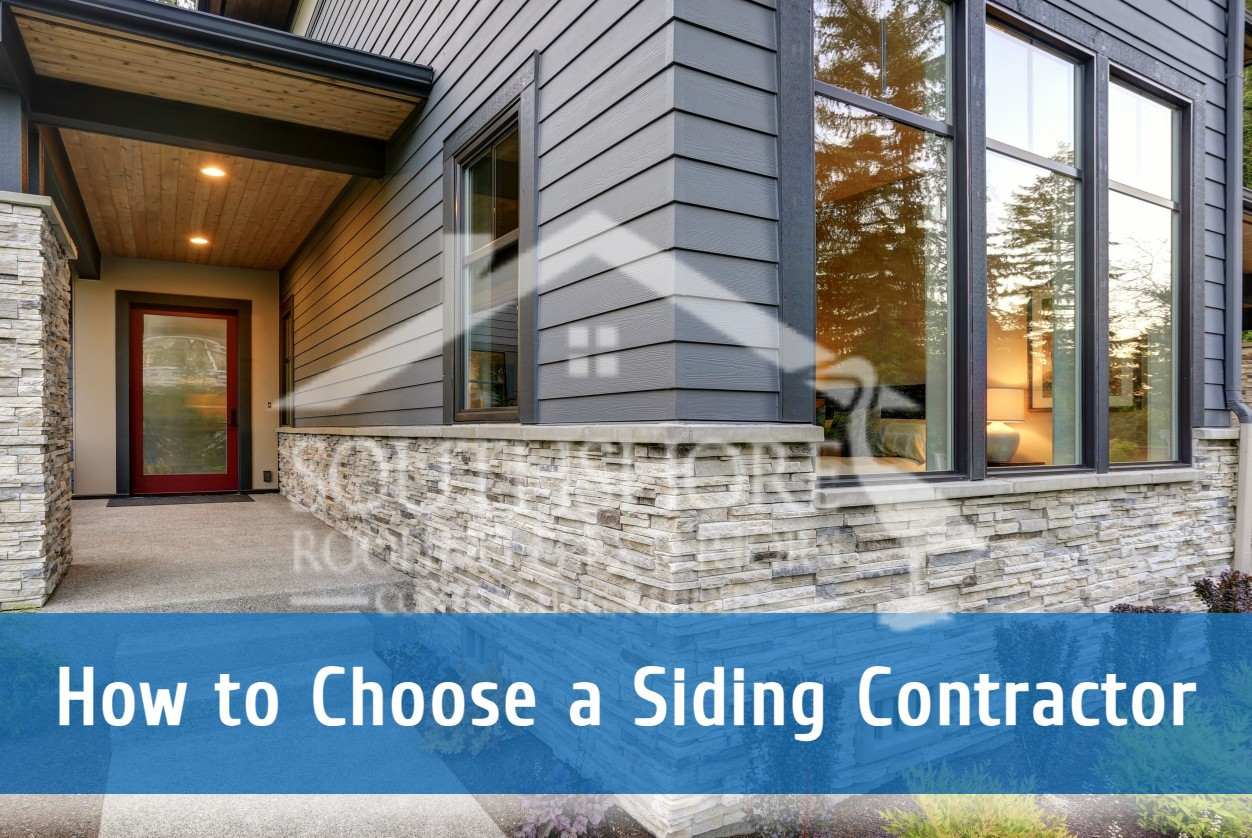Top-Rated Morris Siding Contractor Offering Expert Installation Services
Top-Rated Morris Siding Contractor Offering Expert Installation Services
Blog Article
The Crucial Guide to the Different Sorts Of Exterior Siding and Their Unique Benefits
In the realm of home improvement, picking the appropriate house siding is a critical choice that affects both visual allure and functional performance. The variety of products readily available, such as wood, plastic, fiber block, concrete, and metal, each deal distinct benefits that deal with different requirements and choices. Understanding these differences can considerably enhance the longevity and value of a property - morris siding contractor. With so several alternatives to take into consideration, which exterior siding material truly stands out for your specific project? Discovering these options can lead to educated choices that straighten with both design and usefulness.
Timber Exterior Siding
Timber siding, a popular selection for residential exteriors, provides a timeless aesthetic that integrates natural appeal with architectural stability. This siding product is readily available in various styles, including clapboard, shingles, and board-and-batten, permitting homeowners to customize their façade to match their design choices. Wood house siding is generally crafted from resilient species such as cedar, redwood, or ache, which are known for their durability and ability to hold up against environmental stress factors.
One of the main benefits of wood home siding is its exceptional insulation residential or commercial properties, which can add to power efficiency and reduced home heating prices. Furthermore, timber siding is biodegradable, making it an environmentally pleasant option when sourced sustainably. Regular maintenance, consisting of paint or discoloration, can prolong its lifespan and boost its look, permitting home owners to maintain the natural charm of the timber.
Nevertheless, prospective downsides include vulnerability to bugs, rot, and weather damage, demanding appropriate therapy and upkeep - morris siding contractor. Regardless of these problems, when effectively looked after, wood home siding can offer a durable and gorgeous option that boosts the character of a home while using a cozy, welcoming ambience

Vinyl Exterior Siding
Vinyl exterior siding has emerged as a leading selection for property owners seeking a low-maintenance exterior choice that integrates sturdiness and affordability. This functional material is crafted from polyvinyl chloride (PVC), making it immune to numerous weather condition conditions, consisting of wetness and UV rays. As an outcome, vinyl exterior siding does not warp, rot, or discolor, guaranteeing resilient aesthetic allure.
One of the main advantages of vinyl house siding is its comprehensive series of styles and colors, permitting house owners to achieve the preferred appearance for their property without the demand for frequent repainting. Additionally, vinyl exterior siding is simple to set up, which can dramatically minimize labor expenses during construction or restoration jobs.
Vinyl house siding also contributes to energy effectiveness. Many alternatives attribute insulation backing, which improves thermal efficiency, assisting to maintain comfy interior temperatures and potentially decreasing energy bills. Its smooth surface helps with simple cleaning, needing just periodic washing with a garden hose to eliminate dust and particles.
Fiber Cement Home Siding
Fiber cement house siding has gotten traction among homeowners and builders alike due to its exceptional mix of toughness and aesthetic adaptability. Composed of a mixture of sand, cellulose, and concrete fibers, this house siding alternative is crafted to stand up to extreme climate condition, consisting of high winds, hefty rainfall, and temperature level variations, making it a long-lasting option for household exteriors.

One of the main advantages of fiber concrete siding is its resistance to pests, such as termites, and its non-combustible nature, offering boosted fire safety and security. morris siding contractor. In addition, it is available in a wide array of styles, colors, and structures, permitting homeowners to achieve their wanted visual without giving up efficiency
One more advantage is its reduced upkeep needs; fiber cement siding home generally requires painting or staining every 5-10 years, which is less regular than various other materials. In addition, its durability adds to a lower total price of possession, as it minimizes the need for regular repair work or substitutes.
Ultimately, fiber cement house siding stands for an excellent financial investment for those seeking a resistant, attractive, and versatile exterior choice, integrating both kind and function to boost the home's curb appeal.
Metal House Siding
The attraction of metal siding exists in its durable sturdiness and modern visual charm, making it a preferred option for contemporary design. Readily available in products such as aluminum and steel, steel home siding uses a series of finishes and colors, allowing property owners to accomplish a tailored look that complements their design vision.

Power effectiveness is another substantial advantage, as several steel siding items are developed with insulation choices that aid regulate interior temperatures. This can lead to decreased power costs over time. Furthermore, steel house siding is frequently recyclable, making it an environmentally pleasant choice for sustainability-minded homeowners.
The setup procedure for metal exterior siding can be fairly straightforward, leading to a quicker turnaround time for construction jobs. Generally, metal siding incorporates capability and style, making it a sensible choice for those seeking a long-lasting and visually enticing exterior surface.
Brick and Rock Home Siding
Brick and stone house siding stands out as an ageless option that boosts the aesthetic charm of any kind of home. Understood for their durability and low upkeep, these materials offer an exceptional return on financial investment while linked here boosting the property's curb charm. Readily available in numerous colors, appearances, and patterns, brick and rock can be customized to match varied architectural designs, from conventional to modern.
One of the key advantages of block and stone siding is their power performance. Both materials have natural protecting residential properties that assist regulate interior temperatures, potentially minimizing heating & cooling costs. Furthermore, they provide superior fire resistance contrasted to other exterior siding choices, contributing to improved security.
Another benefit is their longevity. Brick and rock can last for years, usually needing very little upkeep past periodic cleansing. Unlike timber home siding, they are impervious to bugs and rot, ensuring a durable exterior websites that stands up to the components.
Verdict
In summary, the option of home siding significantly influences a home's aesthetic appeal, energy effectiveness, and maintenance requirements. Each type of exterior siding-- whether timber, plastic, fiber metal, brick, or cement and rock-- uses unique benefits tailored to numerous property owner choices and environmental problems.
One of the key benefits of wood exterior siding is its superb insulation buildings, which can add to power efficiency and lower heating prices. Furthermore, wood siding is naturally degradable, making it an ecologically friendly option when sourced sustainably.One of the main advantages of steel home siding is its resistance to numerous environmental variables.Energy efficiency is another significant advantage, as numerous metal exterior siding products are developed with insulation alternatives that assist manage interior temperatures. Each type of siding-- whether timber, plastic, fiber concrete, block, or metal and stone-- provides special advantages customized to various house owner preferences and environmental conditions.
Report this page